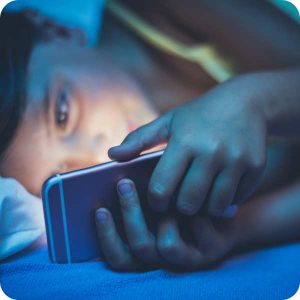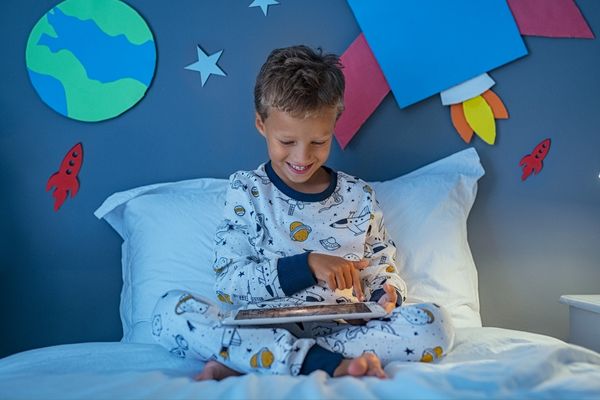 As parents, we all have different opinions and ideals about screen time. As an example, in an ideal world, my kids don’t use their tablets for more than 30 minutes a day. Needless to say, our reality is often different. But, outside of time allocations, we do have some hard rules on usage: no screens during meal times, when eating out, when they’re in an obviously mad mood… and in bed. This article deals with the latter. Is screen time before bed really bad? What does the science say and, more specifically, is there an impact on the child’s well-being?
As parents, we all have different opinions and ideals about screen time. As an example, in an ideal world, my kids don’t use their tablets for more than 30 minutes a day. Needless to say, our reality is often different. But, outside of time allocations, we do have some hard rules on usage: no screens during meal times, when eating out, when they’re in an obviously mad mood… and in bed. This article deals with the latter. Is screen time before bed really bad? What does the science say and, more specifically, is there an impact on the child’s well-being?
Screens and Child Sleep – The Research
Plenty of studies have been carried out in recent years to find out the effects of screen use before bedtime. An absolute majority found a negative connection, mainly due to these reasons:
 The effect of blue light on sleep
The effect of blue light on sleep
“Allowing children to use blue-light emitting devices before bedtime may be comparable to serving them a dose of caffeine,” says researcher Gwen Dewar, Ph.D. This is because blue light promotes alertness and performance and is the most important regulator of the circadian rhythm, aka our sleep-wake cycle. Experts agree that the blue light emitted by electronic devices can tell the brain to delay the onset of sleep. In fact, researchers have noted delayed sleep onset, shorter sleep times, and daytime drowsiness in children in western countries.
Apart from this, blue light from televisions, phones and tablets can suppress melatonin levels. Melatonin is the hormone that promotes feelings of sleepiness, so less melatonin equals less sleep. And in children, this impact is greater as they have larger pupils and are more sensitive to light. One study found that evening light exposure suppressed melatonin twice as much in children as it did in adults.
Type of content consumed
What your child watches may seem harmless to you as an adult, but the content may have an impact on their sleep. What one child may see as exciting, another can find scary, and this can lead to problems with falling asleep and nightmares. In one study, researchers monitored screen use amongst 600 preschoolers and found a link between media use and nightmares. One control group changed the content the kids were consuming, while the other followed usual routines. In six months, the kids watching shows recommended by the researchers were found to less likely suffer from sleep problems.
 Later bedtime and altered sleep patterns
Later bedtime and altered sleep patterns
A systematic review of existing studies found that media use was consistently associated with shorter sleep durations. Sleep is essential – and I’m sure tired parents all over the globe agree. Children who do not sleep enough are more likely to experience inattentiveness, impulsivity, and have difficulty self regulating. According to the Sleep Foundation, symptoms of sleep loss in children often look like ADHD symptoms, which may lead to an ADHD misdiagnosis if the child is consistently not sleeping enough or well. In addition, hormones that aid muscle mass, promote a healthy immune system and repair cells are released during sleep. Not enough sleep can thus lead to more illnesses and health issues.
 How can I reduce bedtime screen use and protect my child’s sleep?
How can I reduce bedtime screen use and protect my child’s sleep?
This is easier said than done, especially if your little one is used to some screen time in the hour before heading to bed. There are ways you can limit the impact of screen time though, if keeping an element of it works best for your family.
Monitor content: As studies show, monitoring what your child is watching and opting for calmer, non-violent content will have less of an impact on sleep.
Make some rules: The amount of time a child spends on screens is directly related to sleep quality and quantity. So rather than going cold turkey from day one, try limiting exposure little by little. Consider introducing a no-screens family rule before bedtime as it can be counterintuitive to establish hard rules for your kids when you’re on your phone browsing or catching up on emails.
And if you’re ready to banish screens in the hour before bedtime:
Try audiobooks or calming music instead of visual content: these options can occupy your child while you get things done at the end of the day, without stimulating them too much and delaying bedtime even further.
Establish a bedtime routine without screens: Reading, a bath, or just simple play time can help your child wind down.
To wrap up
The conversation around screen time can be divisive when it shouldn’t. At the end of the day, we all want the best for our kids, and what works for one family might not work for another. Considering the available research on screen use before bedtime, it makes sense to take stock of what our children are consuming, how much and when. After all, good sleep benefits everyone.
You can also follow us on Facebook and Instagram to have us delivered directly into your newsfeed!



